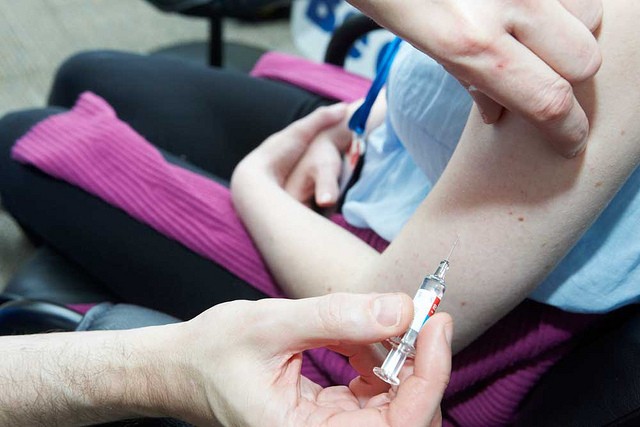
Since the 1940s, antibiotics have played a critical role in protecting the public’s health, and are responsible for saving millions of human lives. Unfortunately, inappropriate use of antibiotics is threatening their efficacy. The use of low doses of antibiotics by the modern food animal industry is responsible for drug-resistant bacteria emerging on farms which reach the general population through human or animal carriers, and through the food consumers eat. Because of the public health risks associated with antibiotic resistance, there is a push to end the use of low doses of medically important antibiotics in order to slow the development of antibiotic resistant bacterial strains. Bacteria are everywhere, including on the skin and in the digestive system of humans. While bacteria are critical to normal bodily functions, some types can cause illness. In humans, antibiotics are used to treat health conditions caused by bacteria, including ear and skin infections, food poisoning, pneumonia, and meningitis. Antibiotics belong to a category of drugs called “antimicrobials,” and include penicillin, tetracycline, amoxicillin and many other formulations that can kill or inhibit the growth of bacteria without causing significant harm to patients.
The featured Frontline News documentary investigates the roots and ramifications of the growing crisis of antibiotic resistance. The US uses nearly 30 million pounds of antibiotics each year to raise food animals. This accounts for about 80 percent of all antibiotics used in the US.
The ramifications of this routine practice can be seen in hospital wards across the nation, as it is one, if not the primary driver of antibiotic-resistant disease in humans.
Large-Scale Agriculture and Hospitals Breed Drug-Resistant Superbugs
One organism alone—methicillin-resistant Staphylococcus aureus (MRSA)—now kills more Americans each year than the combined total of emphysema, HIV/AIDS, Parkinson’s disease, and homicide.
The victims include young, otherwise healthy people, raising suspicions that the MRSA infections originate from the food they eat. Drug-resistant tuberculosis, urinary tract infections, and gonorrhea are also on the rise.
As reported by Frontline, researchers have found that people living close to confined animal feeding operations (CAFOs) also suffer drug-resistant infections at much …
No one is specifically targeting McDonald's—not yet, anyway. But in 2012, Consumers Union, the advocacy arm of Consumer Reports, launched a grassroots campaign that asked grocery retailer Trader Joe's to sell only meat raised without antibiotics. It collected 550,000 signatures, and, for about 9 months, advocates had sporadic discussions with the company. To date, the grocer has not made a commitment, but it has introduced a line of ground turkey raised without antibiotics. Whole Foods remains the only large grocery chain that offers only meat raised without antibiotics. Advocates haven't given up hope. The Organic Consumers Association launched an online petition last November asking Butterball to raise its turkeys without antibiotics. An online campaign at Causes.com has collected 20,000 signatures to ask Walmart to ban antibiotic-raised meat. Such campaigns can be effective, especially if consumers talk directly to retailers. “The pace with which things move in Washington is slow,” says Meg Bohne, who runs Consumers Union's Trader Joe's campaign. “When you're dealing with a crisis like antibiotic resistance, we think the marketplace can move faster.” Take hormones in milk as an example: In 2007, the Oregon chapter of the group Physicians for Social Responsibility launched a campaign to raise awareness about the hormone rBGH in dairy. Today, 75% of all fluid milk and yogurt sold in the United States is rBGH-free.
Please Read this Article at Articles.Mercola.com





Leave a Reply